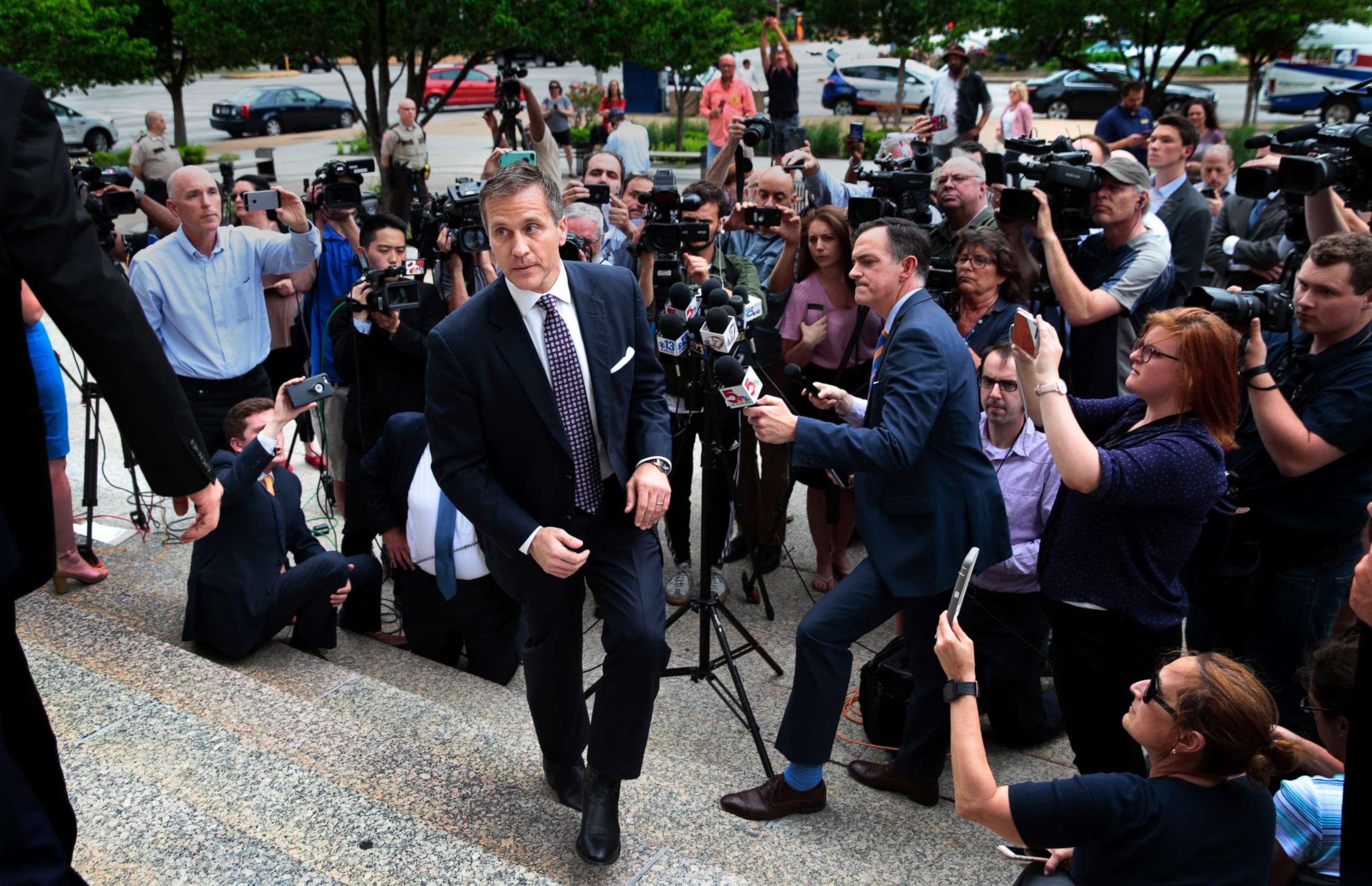Embattled Missouri Gov. Eric Greitens bracing for impeachment proceedings
Legislators are calling a special session to begin impeachment proceedings.
The scandal-plagued saga that has surrounded Missouri Gov. Eric Greitens’ tenure is about to enter a new chapter.
At 6:30 p.m. Friday, legislators at the state capitol in Jefferson City will call to order a special 30-day session to begin impeachment proceedings against the embattled head of the Show-Me State. But expect the impeachment process to be slow, complicated and meticulous.
After Friday night’s official beginning, state house members will meet next week for a series of hearings expected to last several days.
A special investigative committee in the house has already released two ruinous reports against Greitens. The first details accusations made by a woman with whom he was having an affair. She said he threatened and mistreated her. The second report focuses on allegations that Greitens wrongfully obtained a charity donor list to fundraise for political purposes.
If articles of impeachment are approved in the house, the measure then moves to the state Senate. Legislators there will be charged with appointing a panel of seven judges to preside over an impeachment trial. That panel of judges is to be appointed before the end of the 30-day special session, but once seated, the panel can set its own timeframe for moving forward with the trial. At least five judges would have to find the governor guilty for him to be removed from office.
Article VII, Section 1 of the Missouri state constitution lays out the guidelines for impeachment: “All elective executive officials of the state, and judges of the supreme court, courts of appeals and circuit courts shall be liable to impeachment for crimes, misconduct, habitual drunkenness, willful neglect of duty, corruption in office, incompetency, or any offense involving moral turpitude or oppression in office.”

Former Missouri Supreme Court Judge and Chief Justice Michael Wolff, who is now dean emeritus at the St. Louis University School of Law, has been closely following the avalanche of complex problems that Greitens is facing.
“If there is an impeachment trial, it may well focus on the dark money issues, and misleading statements allegedly made to the state ethics commission since he’s been governor," Wolff said. "I assume he would testify, but I could be very wrong.”
Greitens has so far declined all invitations from state leaders to testify under oath.
He entered Jefferson City an outsider and rose to the position of governor promising reform while accusing politicians of corruption.
Now, the former Navy SEAL who was once seen as a rising star in the Republican Party has come to be defined by his political and legal woes.
Prosecutors in St. Louis this week dropped a felony invasion of privacy charge against Greitens just two days before opening arguments in the trial were set to begin.
In that case, a woman Greitens was having an affair with described a sexual encounter where she said he blindfolded and bound her, and then allegedly took a partially nude photo of her. She also claimed he threatened to release the photo if she told anyone.
Greitens admitted to having the affair with the woman, his former hairdresser, in 2015 before becoming governor, but maintained he did not commit any crimes.
Investigators never discovered the alleged picture, and when the judge handling the case approved a defense motion to call St. Louis County Attorney Kim Gardner as a witness during the trial, after allegations her office mishandled evidence, the case collapsed. Gardner vowed the charges would be refiled in the future and will be seeking a special prosecutor.
In a statement after the charge was dropped, a jubilant Greitens said in part, “This is a great victory and it has been a long time coming.”
But even if Greitens is never tried on the invasion of privacy charge, Wolff believes it has already left the governor with some deep, irreparable, political wounds.
“The invasion of privacy indictment was very damaging," Wolff said. "When the house special investigation committee gathered evidence and released this report on the invasion of privacy charge on April 11, the governor lost most of his support among Republicans in the legislature.”
Shortly after Greitens’ statement on the charge being dropped, the former chairman of the Missouri GOP responded in a tweet, “If you win Game 1 of the World Series because your opponent commits 5 errors, I would not recommend ordering Championship rings from the jeweler just yet…”
In fact, Greitens' legal battles are far from over. In a separate criminal case, Greitens has been charged with felony computer tampering for allegedly improperly obtaining a list of donors from his former charity to raise money for his gubernatorial campaign.
Greitens is also accused in a lawsuit of using the encrypted messaging app Confide -- which erases messages after they are read -- to discuss state business, possibly circumventing the state’s open records laws.
Impeachment of governors is rare -- just three in the last 90 years -- but not unprecedented. Illinois Gov. Rod Blagojevich was impeached in 2009, Arizona’s Gov. Evan Meacham in 1988 and Oklahoma’s Gov. Henry S. Johnston in 1929.
As Missouri legislators now turn the page to begin the impeachment process, taking the next steps to remove Greitens, it remains unclear how this real-life political suspense novel will end.
“I am one of the few who believes that he might survive this ordeal and remain governor,” Wolff said.
The blaring calls for his resignation are only growing louder, but Greitens remains defiant.
Soon, he may not have a choice in the matter.




